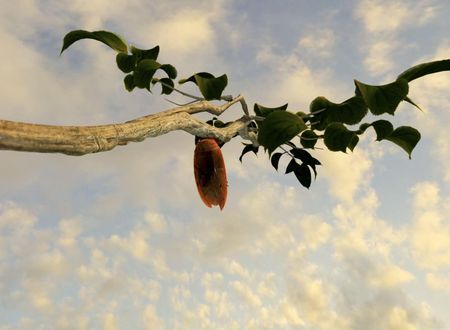Last year, I started learning Hindustani classical vocal music. The elementary classes involved singing notes in various combinations. Some were easy; some difficult. These vocal acrobatics thrilled me. I had longed to learn it for many years. Usually, when my music teacher explained the combinations to me, it was easy peasy. She sang a few notes, and I parroted after her, elated at my performance. But all good teachers push their pupils every now and then. It’s like teaching a child the basics of a swimming stroke and then leaving them to fend for themselves. The child is puffed up with confidence until the parent is swimming along. The waters seem choppy as soon as he is left to find his own way. The stroke is but all forgotten in nervousness. The same child, swimming like a pro a minute ago, can be seen flailing his limbs in panic.
Something similar happened to me during one of the practices. I began most confidently, singing the introductory notes and combinations (known as alankars) with ease. After that, I had to sing a slightly tricky alankar taught to me in the previous class.
Each time I found myself getting stuck at the third step. Determined to get it right, I would quickly move to the first step before my Guru could interrupt and correct me. This was very subconscious; it happened a few times. Suddenly she asked me to stop.
“Wait. Hold on. It is the third step you’re getting wrong. The rest of it is okay. But you are moving way too quickly for me to help you. Why so much self-doubt? Why are you not allowing yourself to make a mistake?”
That’s the inimitable genius of a master. In the course of a music lesson, she had read me as a person. I am a hardwired perfectionist. And I guess I have groomed myself to be like that over the years. It has probably stemmed from the need to be organised to overcome my absentmindedness or may be out of a need for appreciation and validation. Growing up, I found my parents’ house very chaotic. My working parents did not have the time, energy, or inclination to keep the house in a ship shape. It was functional but far from inviting. I grew up with the desire to create a pleasant space that could cradle a tired ‘me,’ where I did not blunder around for things. Together, my husband and I created that space. It takes a lot of life energy to maintain a beautiful home, but it is worth it!
Secondly, I had worked very hard to be accepted into my husband’s family, which is culturally quite different from mine. It is difficult to tell when and how one aspect of your personality begins to spill over and reflect in other compartments of your life. Unbeknownst to myself, the need to be perfect had seeped into my system. My music teacher could sense that weakness immediately. I had not realised how much this trait had impacted me at a subconscious level.
“Why stress yourself about being perfect? In seeking perfection, you will end up making more mistakes. Let yourself go. Trust implicitly and have the courage to make mistakes. I am there to correct them. Who is expecting perfection?” She reasoned most amiably.
For a few seconds, I was numb. It was as if someone had shaken me up from a deep slumber. The self-doubt alongside perfection had entrenched my very being. Both are contradictory; yet they coexist.
Trusting my music teacher, I let myself go. Yes, I made mistakes, but this time she could help. Ponting to the next alankar she said, “try it; you’ll do it easily.”
I smiled sheepishly, unsure of myself. It was a new arrangement of swaras; I had never sung it before. With some prodding, I attempted it and found myself singing the entire piece. How could I do it? I was amazed. How was my mind making connections not apparent to me?
My music teacher, while smiling, was not surprised in the least. While learning music, I realised that our mind has an extraordinary capacity to remember and reproduce. It begins to flow with the music. With time, the notes—and their many permutations and combinations— become a part of you. However, one has to beat perfection.
She points out, “When you have learned it all, it’s then that you must be cautious. Ensure that you do not become an automaton.”
This idea holds true for everything we learn and do in life, particularly the habits deemed ‘desirable.’. Do we ever stop to ask, “ am I overdoing it?” In a hurry to become perfect, we often forget how enjoyable the journey is. There is romance in being a novice, the innocence of not knowing, yet having the belief to give it your all.
Sometimes, I find parallels between music and meditation. My teacher asks me to sing a pattern (the swaras-chalan-bandish of a raga) and spend time with the process without expecting too much. It’s good to ask questions, but at one point, you have to surrender yourself to the process. All questioning must cease.
“There is no ‘maza’ in a riyaaz, at the beginning. No elixir of swaras will come dripping. But you keep going day after day. After several hundred hours, the raga will reveal itself to you, perhaps. You will begin to see how the swaras caress each other as you go up and down the scale. Us din maza ayega. Do not seek ‘maza’ right away.”
I find it very similar to Swami’s words about meditation. For the first few thousand hours, you need to show up on the mat and practice with precision. In fact, any feeling of ‘pleasure’ might be a sign of wrong practice.
“If you are lucky, in some moments, music might become meditative. It does not happen all the time. In some moments, yes.” My teacher says with the certainty of an adept.
The Dawning
The bird in me is learning to sing
Its own song
With all its sweet and discordant notes.
True or not, they are mine
The bird in me has begun to dream
To fly and claim its share of the sky
It pecks at the prison of self-doubt
Day in and day out
Chipping off the iron bars
Bit by bit
The bird in me is learning not to fear
The fall as it learns to fly
Each fall fills its wings with courage
Each fall normalizes falling
The bird in me is learning to be a bird again
Birds sing — for the wind, rains, and themselves
Yes, they may sing for the crowds sometimes
Birds fly — to assert the speck of their existence
On the wide expanse of the sky
Yes, sometimes they may swoop and flit
To show off their wings
The bird in me is waking up to find
The bars were the shackles of the mind
It is ever free to twitter, chirp, or cackle
It is ever free to glide, flutter or flump down
Every false note, every wrong move
Takes it closer to eternal flight and music
Real birds fall many times before they trust their wings
Before they take the first flight
(Image credit
https://www.pxfuel.com/en/desktop-wallpaper-gwneq)









Comments & Discussion
16 COMMENTS
Please login to read members' comments and participate in the discussion.